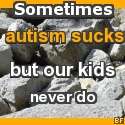
Let's talk about anxiety. I have dealt with it all my life. Anxiety is a bodily response to stress. Through self-talk (Cognitive Behavior Therapy) I have learned to talk myself down from catastrophizing and have the anxiety at manageable levels, most of the time. I know that the fear in anxiety is pretty much a lie your brain tells to get you worked up. So I know how to deal with it. But, anxiety is systemic, and it gets passed around in a family system. It also runs in families. My oldest daughter suffers from anxiety much worse than I ever did.
Over the years, we have figured out some things that work for us, and believe me, we have been through a lot of trial and error in dealing with it. We have a great therapist, and that is always my first suggestion. An anxious child is very hard to treat on your own. Anxiety is sneaky. It might seem addressed, but it can crop up in other ways. It manifests sideways and can sometimes be difficult to trace.
One of the ways it shows up with my daughter is in novel situations. She has a negative first reaction to everything, it has become a joke in our family. I know she will react adversely to every new situation, that's just the way it is. And the few times it hasn't happened, I have been pleasantly surprised. Over the years we have found some things that work for us.

What We Do For Anxiety:
1. We create "signposts" to point to success. I set her up to succeed, by reminding her of times when things worked. This approach comes from the Hebrews, who set up little monuments whenever God did something of import, so they could remember. Her signposts are similar experiences that have worked out for her.
For instance, she had to wear a pair of gold sandals for a play she was involved in. She hated those sandals: hated how ornate they were, hated how they felt... by the time the play was over, she loved them. I also point out to how well she has done in past endeavors, like classes, youth group, and whatever else comes up. Reminding her of these are little celebrations that increase her confidence.2. I require her to try everything for at least 3 weeks. Why? Because with a negative first reaction, she wants to quit as soon as she hits a snag. She is a perfectionist and is constantly worried that she won't be "good enough." Her new Biology class was a problem at first, as she was trying to figure out what would be required. At what point she said she would have to drop. I reminded her on the commitment to stay with it. Turned out, not only could she handle it, the class was enjoyable and fairly easy for her as well. I don't know what I would do if after 3 weeks she wanted to stop an activity, but it hasn't happened yet, so I haven't had to worry.
3. Deep breathing, relaxation techniques. When you grow anxious, your blood pressure rises. You begin to breathe shallowly. Your heart starts to pound, as your fight or flight reaction is triggered. Your body dumps adrenalin in preparation of a quick flight. The adrenalin high is short-lived, and as it fades, stomach upset, shakiness and headache can occur. Anxiety can be a nasty thing. If you can catch it before it balloons, often you can pull yourself back down before it causes major problems.
4. Self-talk is important. Many who suffer from anxiety "catastrophize" which means they imagine the absolute worst, without defining it or thinking it through. The way to deal with this is to hit it square on. WHAT will happen? And then what? And then? And then? You quickly find out that what you fear is not the end all and be all of life. In fact, in the scheme of things, it is probably pretty small.
Today my daughter was a few minutes late for class. She started to have a panic attack as she imagined getting a "demerit" which is the threat the program uses for discipline. After some deep breathing she was better, but She kept saying, "I am going to be late, I will get a demerit!" And I simply said: "Oh? What will happen then?" She said, "I don't know!" And I said, "Will they throw you out of the program for being 5 minutes late?" She thought for a moment: "No, probably not..." Right. She put it in perspective and was still upset, but it wasn't the end of the world.
5. She has some social phobia, and is a red-line introvert. She is learning to work around it, by having scripts for conversations. She still has a hard time approaching a group uninvited, even if she has known the kids involved for years. She is getting better. She doesn't like to look foolish, so she resists games.
She keeps a schedule, because she likes to know what is happening. This has gone a long way towards alleviating her anxiety. If she knows what is coming, she feels better.
Don't think that her similarities to my other children are lost upon me- they aren't. But the good news is, she has figured out for the most part, how to work around her fears. She still lets them hold her back some, but as she matures, it happens less and less. And, we recognize the triggers sooner, and she compensates quicker.
The bottom line? She will probably never be completely anxiety-free. I am not. I don't let my feelings take over, though. There is no reason to think she too won't learn to live with her fears in a way that is both healthy and allows her to grow as a person. Anxiety isn't a death sentence. It doesn't always require medication. Cognitive Behavior Therapy makes a huge difference in its management. Sometimes you can treat it yourself, but never be afraid to seek help. My daughter has an awesome psychologist, whom she loves. He has gone a long way in helping her grow and become more self-aware.
whom she loves. He has gone a long way in helping her grow and become more self-aware.
If you or someone you love deals with anxiety, don't make the mistake thinking it will go away. Deal with it, head on. You will be happier in the long run. Once social phobias are entrenched, the habits become harder to dislodge.
Your question of the day:
How do you handle your day-to-day stress?
T, who says anxiety is nothing to be ashamed of

































6 sent chocolate:
So any reason you wrote this at this time? I can't help but think there was some supernatural influence here because it seems like exactly what I needed to hear. Thanks. :-)
Excellent post. Anxiety runs through my family to and yes a lot of trial and error is involved.
How funny that you would write this today...it would appear that you had your ear on the pulse of the blogosphere today. I also needed to hear this today, for ME, not for my kids and I thank you for that.
I ignore it until I have no choice but to capitulate by going to sleep or working out really, really hard. Helpful post.
Great and needful post! I have anxiety and my son with HFA/OCD has quite a struggle with it as well. We've found that a combo of medication and coping strategies works best for us. It's always comforting to know you aren't the only family dealing with the "A" word though...
starlene: I am glad it was helpful. I know how frustrating anxiety can be, it's exhausting!
casdok: yes! trial and error is what it is all about. There's times when it can be really a challenge. If you figure out the "secret" let me know, ok?
anissa: I hope you are doing better and your anxiety is under control...hang in there!
uptake: does ignoring it work for you? Because it just makes me antsy and I get upset with the kids if I don't deal with my own frustrations
topsytechie: we went through a time with medication. Now, for the most part, things can be dealt with without it, but if we need to, I will put my daughter back on it. We stopped in the 6th grade.
T.
Post a Comment